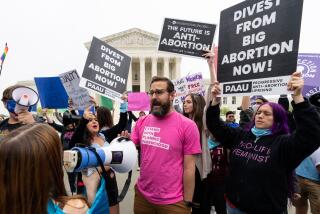Federal Role in Baby Doe Cases Barred
- Share via
WASHINGTON — The Supreme Court ruled today that the Reagan Administration has no legal authority to pressure hospitals and doctors to provide medical care to extend the lives of deformed or gravely ill infants.
By a 5-3 vote, the court held that federal regulators have no role to play in so-called Baby Doe cases and that a 1973 law banning discrimination against handicapped people cannot be applied to such cases.
The decision, sparked in part by highly publicized cases in Bloomington, Ind., and Long Island, N.Y., signals an end to Reagan Administration efforts to push for extraordinary medical care for such babies even against the parents’ wishes.
Not affected are state laws that already regulate the decisions that doctors and parents make about treating such infants.
Federal Money Cited
Justice Department lawyers had urged the court to rule that the Rehabilitation Act of 1973 gives federal regulators the power to make sure no hospital receiving federal money denies nourishment or medical treatment to a child “solely because of its handicap.”
But lawyers for the American Hospital Assn. and the American Medical Assn. said Congress never intended the law to grant federal authority in an area traditionally regulated by the states.
Today, the Supreme Court agreed with two lower courts and ruled that the Reagan Administration was reading the 1973 law wrong.
Writing for four members of the court, Justice John Paul Stevens said the Administration’s view of the law amounted to a “manifestly incorrect perception.”
More to Read
Sign up for Essential California
The most important California stories and recommendations in your inbox every morning.
You may occasionally receive promotional content from the Los Angeles Times.













